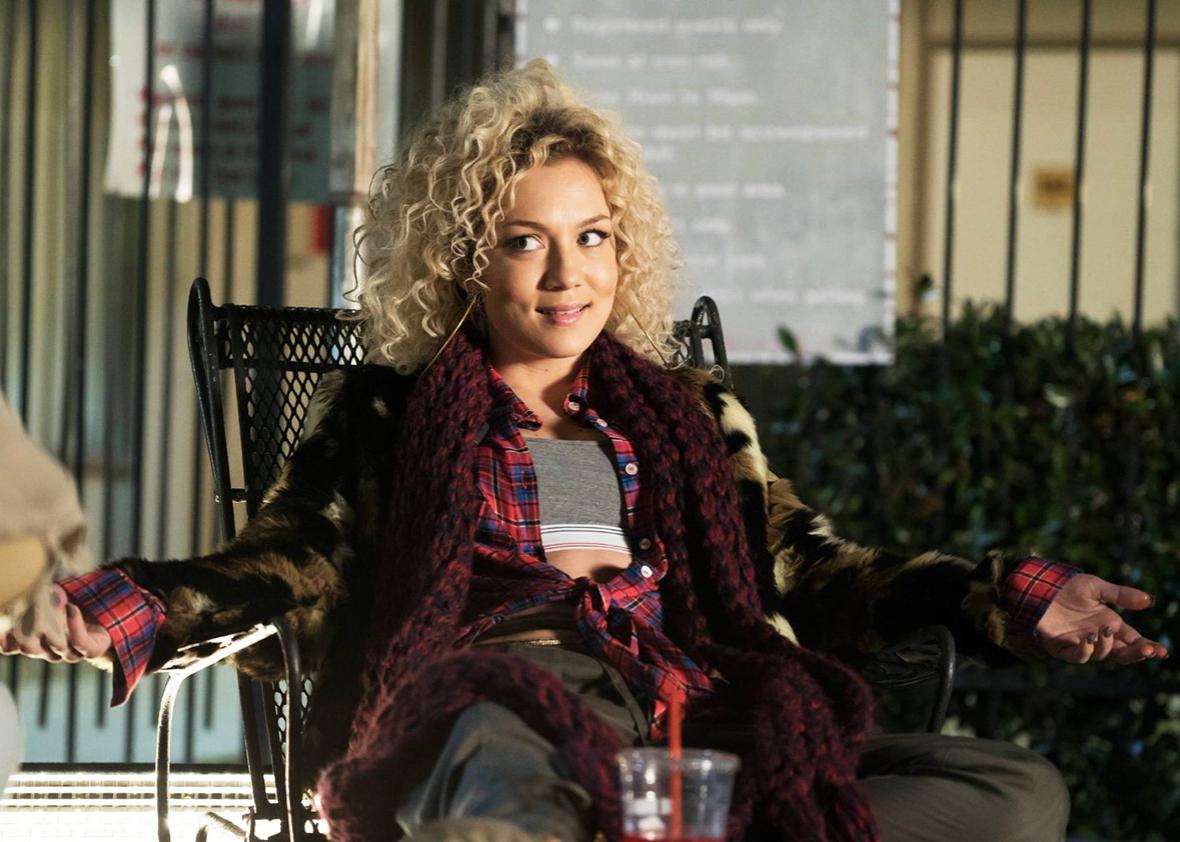Last week, appearing on the talk show The Real, director Lee Daniels said he cast a white woman in the lead role of his new Fox show Star, which is more fascinating than it is enjoyable, because “I felt that the country—instinctively, I thought—needed to heal. I think that this white girl is so fabulous that black people will embrace her and white people will embrace her.” Cocked eyebrows are the appropriate reaction to this statement, but then cocked eyebrows are the appropriate and intended reaction to much of Daniels’ work.
Star is the erratic follow-up to Daniels’ onetime monster hit Empire, a multigenerational soap opera about the Lyons clan, music business impresarios. From the start, Empire riffed on the shoulder-pad soaps of the ’80s, chronicling the wild lifestyle of a rich and famous family. What distinguished Empire from Dynasty and Dallas was black fabulousness and a sprinkling of bracing details. Cookie Lyon (Taraji P. Henson), in her cavalcade of animal prints, for example, beat her son Hakeem (Bryshere Gray) with a broom out of love and accepted her gay son Jamal (Jussie Smollett) while also calling him “faggot.” There was a flashback, based on Daniels’ own experience, of Jamal being tossed into a garbage can by his father Lucious (Terrence Howard) for trying on his mother’s heels. Even rich people have their shit. Daniels’ work is erratic, but it’s also fearless, full of unpious, totally true moments no one else has set to screen.
Star is a looking glass companion piece to Empire. The latter is a music business soap opera about people who have made it; the former is a music business soap opera about a woman desperate to do so. Before Star, Daniels floated the idea of a prequel about Cookie Lyon’s youth. Star is not that show, but they share the same nugget of an idea: the hardscrabble life from which a star is born. As the series begins, Star (Jude Demorest) is not yet 18 and bouncing around foster care in Pittsburgh. Her mother overdosed when she was a kid, and she’s spent the years since stealing and lying, all while dreaming of using her fantastic voice to make it big. She’s formed a working relationship with Alexandra (Ryan Destiny), whom she met over Instagram and who happens, secretly, to be the daughter of a famous musician (played by Lenny Kravitz). At breakneck speed, Star gets released from the system and goes to find the sister, Simone (Brittany O’Grady), she hasn’t seen in years. The two meet up with Alexandra and head for Atlanta, with a dream of starting a girl group and plans to stay with Carlotta (Queen Latifah), the sisters’ long lost godmother.
What Daniels meant by “healing,” perhaps, is that Star is a poor white girl who had been poorly served by the government and, instead of becoming an aggrieved, Trumpist xenophobe, casually inhabits a multiracial world while striving to achieve her outsized ambitions. I doubt Star could do as much healing as a scummy Band-Aid, but she is, at least, not the type of white girl who appears on television very often, outside the confines of reality TV. Star is a poor, abused, unconnected, underprivileged woman who has experienced tremendous hardship but who still experiences white privilege. Even if she’s too hard-up to recognize it for what it is, the show sees it.
Star does not work with, socialize with, or see many other white people. Even her family, Carlotta and her biracial sister, is black. Working at Carlotta’s beauty shop, and getting relentless teased for being white, Star loses it and accuses her teasers of being “racist.” It reminded me of the moment Cookie said “faggot” on Empire, insofar as the show’s not asking you to write the speaker off, it’s asking you to consider where she’s coming from—and then in Star’s case, to also notice the way the white professional football player at a gig sidles up to her lily-white self instead of to her bandmates.
Aspiration is a key part of soap operas’ appeal. That’s why they are about beautiful people, sex, love, and conspicuous consumption. But Star is not aspirational at all—it doesn’t make you want to be any of these people—while being literally about aspiration. Star is unprecedentedly down on its heels for a soap, making pit stops in strip clubs, foster homes ruled by sexual predators and obese and lazy white tyrants, social services offices, and downscale hair salons where the wigs are made of goat hair.
Star herself is the kind of person who can stab someone and not worry about it much, who flips licenses plates on stolen cars like they are coins. Whereas someone else might worry about dancing in a strip club as a way to catch the eye of a potential manager, Star has no qualms. (All the strippers perform a choreographed number with her, and she lands the manager, in a scene I was convinced was a fantasy sequence until it wasn’t.) Deep down inside, Star is not a good girl. She doesn’t have the untouchable integrity of the people who “make it” in our fantasies. Instead she has talent, grit, and absolutely no scruples. This, to Daniels, is fabulous. I wonder if it will be to the audience at large. Demorest is convincing in the role, but she’s not crowd-pleasing. She may be pre-ordained by the show to thrive, but she has the reckless and raw vibe of someone else, a survivor.
